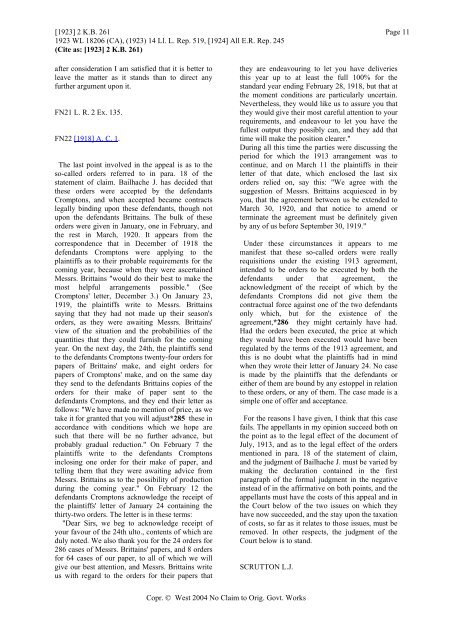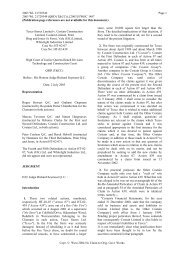Rose - Thomson Reuters
Rose - Thomson Reuters
Rose - Thomson Reuters
You also want an ePaper? Increase the reach of your titles
YUMPU automatically turns print PDFs into web optimized ePapers that Google loves.
[1923] 2 K.B. 261 Page 111923 WL 18206 (CA), (1923) 14 Ll. L. Rep. 519, [1924] All E.R. Rep. 245(Cite as: [1923] 2 K.B. 261)after consideration I am satisfied that it is better toleave the matter as it stands than to direct anyfurther argument upon it.FN21 L. R. 2 Ex. 135.FN22 [1918] A. C. 1.The last point involved in the appeal is as to theso-called orders referred to in para. 18 of thestatement of claim. Bailhache J. has decided thatthese orders were accepted by the defendantsCromptons, and when accepted became contractslegally binding upon these defendants, though notupon the defendants Brittains. The bulk of theseorders were given in January, one in February, andthe rest in March, 1920. It appears from thecorrespondence that in December of 1918 thedefendants Cromptons were applying to theplaintiffs as to their probable requirements for thecoming year, because when they were ascertainedMessrs. Brittains "would do their best to make themost helpful arrangements possible." (SeeCromptons' letter, December 3.) On January 23,1919, the plaintiffs write to Messrs. Brittainssaying that they had not made up their season'sorders, as they were awaiting Messrs. Brittains'view of the situation and the probabilities of thequantities that they could furnish for the comingyear. On the next day, the 24th, the plaintiffs sendto the defendants Cromptons twenty-four orders forpapers of Brittains' make, and eight orders forpapers of Cromptons' make, and on the same daythey send to the defendants Brittains copies of theorders for their make of paper sent to thedefendants Cromptons, and they end their letter asfollows: "We have made no mention of price, as wetake it for granted that you will adjust*285 these inaccordance with conditions which we hope aresuch that there will be no further advance, butprobably gradual reduction." On February 7 theplaintiffs write to the defendants Cromptonsinclosing one order for their make of paper, andtelling them that they were awaiting advice fromMessrs. Brittains as to the possibility of productionduring the coming year." On February 12 thedefendants Cromptons acknowledge the receipt ofthe plaintiffs' letter of January 24 containing thethirty-two orders. The letter is in these terms:"Dear Sirs, we beg to acknowledge receipt ofyour favour of the 24th ulto., contents of which areduly noted. We also thank you for the 24 orders for286 cases of Messrs. Brittains' papers, and 8 ordersfor 64 cases of our paper, to all of which we willgive our best attention, and Messrs. Brittains writeus with regard to the orders for their papers thatthey are endeavouring to let you have deliveriesthis year up to at least the full 100% for thestandard year ending February 28, 1918, but that atthe moment conditions are particularly uncertain.Nevertheless, they would like us to assure you thatthey would give their most careful attention to yourrequirements, and endeavour to let you have thefullest output they possibly can, and they add thattime will make the position clearer."During all this time the parties were discussing theperiod for which the 1913 arrangement was tocontinue, and on March 11 the plaintiffs in theirletter of that date, which enclosed the last sixorders relied on, say this: "We agree with thesuggestion of Messrs. Brittains acquiesced in byyou, that the agreement between us be extended toMarch 30, 1920, and that notice to amend orterminate the agreement must be definitely givenby any of us before September 30, 1919."Under these circumstances it appears to memanifest that these so-called orders were reallyrequisitions under the existing 1913 agreement,intended to be orders to be executed by both thedefendants under that agreement, theacknowledgment of the receipt of which by thedefendants Cromptons did not give them thecontractual force against one of the two defendantsonly which, but for the existence of theagreement,*286 they might certainly have had.Had the orders been executed, the price at whichthey would have been executed would have beenregulated by the terms of the 1913 agreement, andthis is no doubt what the plaintiffs had in mindwhen they wrote their letter of January 24. No caseis made by the plaintiffs that the defendants oreither of them are bound by any estoppel in relationto these orders, or any of them. The case made is asimple one of offer and acceptance.For the reasons I have given, I think that this casefails. The appellants in my opinion succeed both onthe point as to the legal effect of the document ofJuly, 1913, and as to the legal effect of the ordersmentioned in para. 18 of the statement of claim,and the judgment of Bailhache J. must be varied bymaking the declaration contained in the firstparagraph of the formal judgment in the negativeinstead of in the affirmative on both points, and theappellants must have the costs of this appeal and inthe Court below of the two issues on which theyhave now succeeded, and the stay upon the taxationof costs, so far as it relates to those issues, must beremoved. In other respects, the judgment of theCourt below is to stand.SCRUTTON L.J.Copr. © West 2004 No Claim to Orig. Govt. Works
















